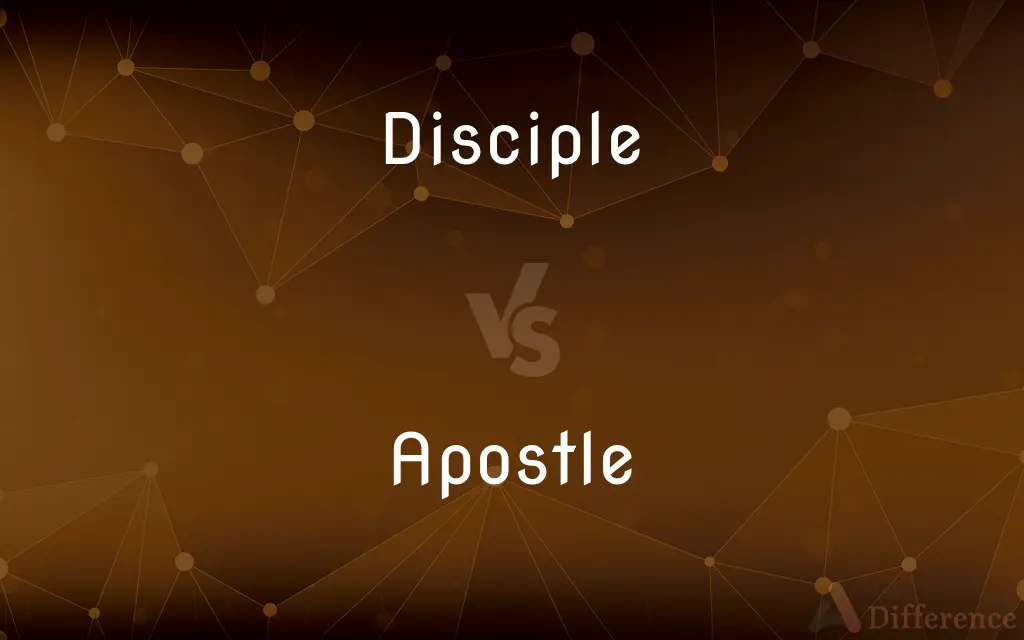Disciple vs. Apostle — What's the Difference?
Edited by Tayyaba Rehman — By Urooj Arif — Updated on March 15, 2024
A disciple is a follower or student of a teacher, leader, or philosophy, while an apostle is specifically sent on a mission to preach and spread teachings.

Difference Between Disciple and Apostle
Table of Contents
ADVERTISEMENT
Key Differences
Disciples are learners or adherents of a particular teacher or doctrine, focusing on receiving and practicing teachings. They are found in various religious and philosophical traditions, where their primary role is to learn and internalize the teachings of their mentor. Apostles, on the other hand, carry a specific mandate to spread the teachings they have received. The term is most closely associated with Christianity, where the Apostles were chosen by Jesus Christ to spread his teachings throughout the world.
Discipleship involves a personal commitment to learning and growth, often within a community of fellow learners. Apostles are characterized by their mission-oriented nature, having been sent out to preach, convert, and establish religious communities.
While disciples are generally seen as students or followers, apostles are viewed as messengers or ambassadors. This distinction highlights the active, mission-driven role of apostles compared to the more receptive and learning-focused role of disciples.
Discipleship and apostleship both involve a deep commitment to a set of teachings or a teacher. However, the expected outcomes of their roles differ significantly. Disciples aim to deepen their own understanding and practice, whereas apostles are tasked with spreading the message and expanding the community of believers.
The transition from disciple to apostle in some traditions, notably Christianity, signifies a shift from learning and internalizing teachings to actively working to share and implement those teachings in the broader world. This shift is not merely about knowledge transmission but involves a transformation in identity and purpose.
ADVERTISEMENT
Comparison Chart
Definition
A follower or student of a teacher, leader, or philosophy.
Someone specifically sent on a mission to preach or spread teachings.
Role
Primarily to learn and internalize teachings.
To spread the teachings and establish communities.
Focus
Personal growth and understanding.
Mission and outreach.
Origin
Generic term used in various religious and philosophical contexts.
Particularly used in Christianity, denoting those sent by Jesus.
Transformation
From learning to practicing teachings.
From receiving teachings to actively spreading them.
Compare with Definitions
Disciple
Someone who adopts the beliefs and practices of a particular figure or philosophy.
As a disciple of non-violence, he protested peacefully.
Apostle
One of the twelve followers of Jesus Christ in Christianity.
The Apostle Paul wrote many letters that are now part of the New Testament.
Disciple
A learner who follows the teachings of a master.
The disciples gathered around their teacher to learn the secrets of the craft.
Apostle
Someone who pioneers or advocates for a particular cause or idea.
She was considered an apostle of modern architecture.
Disciple
An adherent of a religious faith or doctrine.
She was a devoted disciple of the new spiritual movement.
Apostle
A person sent by a church to preach and establish new congregations.
The church sent out apostles to the uncharted regions to establish new communities.
Disciple
A student under the direct guidance of a mentor.
The young artist became a disciple of a renowned painter.
Apostle
A messenger sent on a specific mission, especially in a religious context.
The apostles were tasked with spreading the message across the lands.
Disciple
A follower who seeks to emulate the life and teachings of a leader.
His disciples continued his work long after he was gone.
Apostle
A leading proponent of a movement or ideology.
As an apostle of free speech, he fought tirelessly for the rights of the oppressed.
Disciple
A personal follower of Christ during his life, especially one of the twelve Apostles.
Apostle
An apostle (), in its most literal sense, is an emissary, from Greek ἀπόστολος (apóstolos), literally "one who is sent off", from the verb ἀποστέλλειν (apostéllein), "to send off". The purpose of such sending off is usually to convey a message, and thus "messenger" is a common alternative translation; other common translations include "ambassador" and "envoy".The term derives from the Greek of the New Testament and was used for Jesus's original Twelve Apostles (including Peter, James, and John), as well as a wider group of early Christian figures, including Paul, Barnabas, and Junia.
Disciple
One who embraces and assists in spreading the teachings of another.
Apostle
Each of the twelve chief disciples of Jesus Christ.
Disciple
An active adherent, as of a movement or philosophy.
Apostle
Apostle One of a group made up especially of the 12 disciples chosen by Jesus to preach the gospel.
Disciple
Often Disciple One of the original followers of Jesus.
Apostle
A missionary of the early Christian Church.
Disciple
Disciple A member of the Disciples of Christ.
Apostle
A leader of the first Christian mission to a country or region.
Disciple
A person who learns from another, especially one who then teaches others.
Apostle
One of the 12 members of the administrative council in the Mormon Church.
Disciple
An active follower or adherent of someone, or some philosophy etc.
Apostle
One who pioneers an important reform movement, cause, or belief
An apostle of conservation.
Disciple
(Ireland) A wretched, miserable-looking man.
Apostle
A passionate adherent; a strong supporter.
Disciple
To convert (a person) into a disciple.
Apostle
A missionary, or leader of a religious mission, especially one in the early Christian Church (but see Apostle).
Disciple
To train, educate, teach.
Apostle
A pioneer or early advocate of a particular cause, prophet of a belief.
Disciple
To routinely counsel (one's peer or junior) one-on-one in their discipleship of Christ, as a fellow affirmed disciple.
Apostle
A top-ranking ecclesiastical official in the twelve seat administrative council of The Church of Jesus Christ of Latter-day Saints.
Disciple
One who receives instruction from another; a scholar; a learner; especially, a follower who has learned to believe in the truth of the doctrine of his teacher; an adherent in doctrine; as, the disciples of Plato; the disciples of our Savior.
Apostle
A person who is plucked, that is, refused an academic degree.
Disciple
To teach; to train.
That better were in virtues discipled.
Apostle
(legal) A letter dismissory.
Disciple
To punish; to discipline.
Apostle
(legal) A note sent to an appeals court presenting the appeal in summary.
Disciple
To make disciples of; to convert to doctrines or principles.
Sending missionaries to disciple all nations.
Apostle
(legal) The trial court record sent to an appeal court concerning an appeal.
Disciple
Someone who believes and helps to spread the doctrine of another
Apostle
Literally: One sent forth; a messenger. Specifically: One of the twelve disciples of Christ, specially chosen as his companions and witnesses, and sent forth to preach the gospel.
He called unto him his disciples, and of them he chose twelve, whom also he named apostles.
Apostle
The missionary who first plants the Christian faith in any part of the world; also, one who initiates any great moral reform, or first advocates any important belief; one who has extraordinary success as a missionary or reformer; as, Dionysius of Corinth is called the apostle of France, John Eliot the apostle to the Indians, Theobald Mathew the apostle of temperance.
Apostle
A brief letter dimissory sent by a court appealed from to the superior court, stating the case, etc.; a paper sent up on appeals in the admiralty courts.
Apostle
An ardent early supporter of a cause or reform;
An apostle of revolution
Apostle
Any important early teacher of Christianity or a Christian missionary to a people
Apostle
(New Testament) one of the original 12 disciples chosen by Christ to preach his gospel
Common Curiosities
Are the terms "disciple" and "apostle" interchangeable?
No, they refer to distinct roles, with disciples being learners and apostles being messengers.
Can a disciple become an apostle?
Yes, in some religious contexts, a disciple can become an apostle when sent on a specific mission.
Do all religions have apostles?
No, the concept of apostles is most prevalent in Christianity, though similar roles exist in other faiths.
Are all apostles disciples?
Generally, yes, as apostles start as disciples who learn before they are sent out on their missions.
What responsibilities do apostles have?
Apostles are responsible for spreading teachings, converting believers, and establishing communities.
What is the main difference between a disciple and an apostle?
A disciple is a follower or learner of a teaching, while an apostle is sent on a mission to spread those teachings.
How do apostles spread their teachings?
Apostles spread teachings through preaching, writing, and establishing communities.
Is the role of a disciple limited to religious contexts?
No, discipleship can apply to any context where there is a learner-teacher relationship.
What is the significance of apostleship in Christianity?
Apostleship is central to Christianity, as the apostles were tasked with spreading Jesus' teachings and founding the early church.
How did the apostles in Christianity spread their message?
They traveled extensively, preached, wrote letters, and formed early Christian communities.
Can the concept of an apostle apply outside of a religious context?
Yes, it can apply metaphorically to anyone pioneering or advocating vigorously for a cause or idea.
What characteristics define a disciple?
Disciples are characterized by their willingness to learn, follow, and practice teachings.
Can someone be an apostle without being a disciple first?
Typically, becoming an apostle involves first being a disciple to learn the teachings that one will spread.
Do disciples have a specific mission like apostles?
Disciples focus on learning and personal growth rather than a specific mission to spread teachings.
How do modern interpretations of discipleship and apostleship differ from ancient ones?
Modern interpretations may focus more on the metaphorical journey of learning and spreading ideas, whereas ancient ones had more literal and religious connotations.
Share Your Discovery

Previous Comparison
Gorgeous vs. Handsome
Next Comparison
Integrate vs. IntegrityAuthor Spotlight
Written by
Urooj ArifUrooj is a skilled content writer at Ask Difference, known for her exceptional ability to simplify complex topics into engaging and informative content. With a passion for research and a flair for clear, concise writing, she consistently delivers articles that resonate with our diverse audience.
Edited by
Tayyaba RehmanTayyaba Rehman is a distinguished writer, currently serving as a primary contributor to askdifference.com. As a researcher in semantics and etymology, Tayyaba's passion for the complexity of languages and their distinctions has found a perfect home on the platform. Tayyaba delves into the intricacies of language, distinguishing between commonly confused words and phrases, thereby providing clarity for readers worldwide.













































